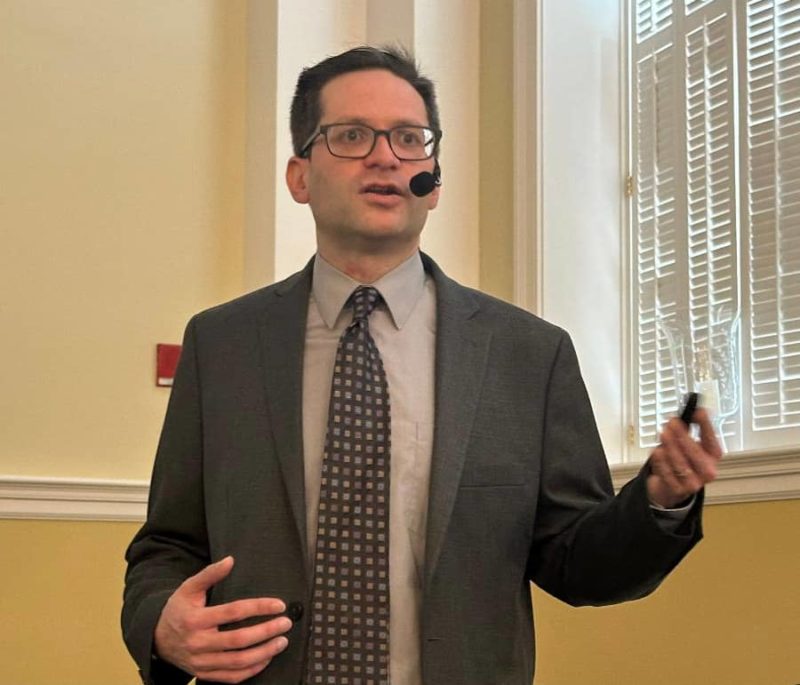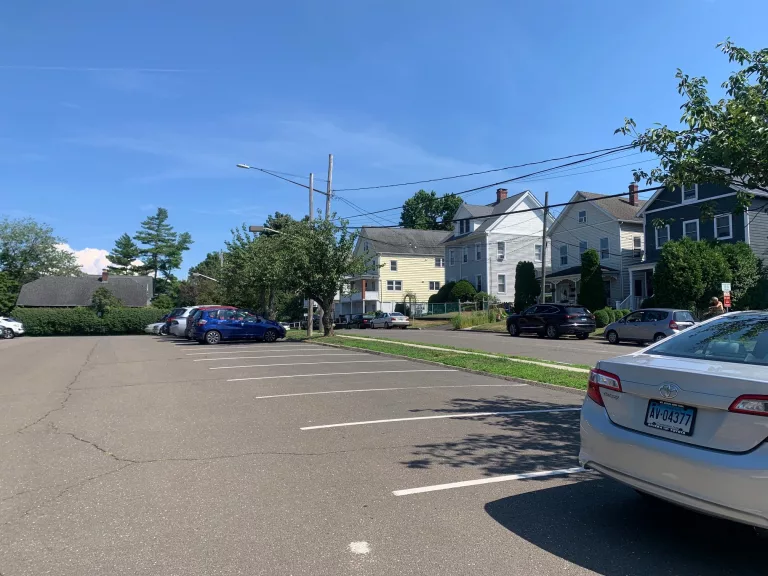
By Fred Wu
At the May 8th meeting of the Retired Men’s Association, Spike Lipschutz introduced Benjamin Lebwohl, Professor of Medicine and Epidemiology at Columbia University Irving Medical Center, Associate Clinical Chief of the Division of Gastroenterology, and Director of Clinical Research at the Celiac Disease Center at Columbia University. Dr. Lebwohl spoke about the illnesses and death of the famous composer Ludwig van Beethoven.
Dr. Lebwohl began by emphasizing Beethoven’s monumental importance and influence in the history of Western classical music. He transformed multiple genres like the string quartet, piano sonata, and symphony, and redefined what it meant to be an artist, moving away from being a servant to nobility to being seen as a revolutionary and heroic sufferer.
The lecture then moved into exploring the various sources that provide insight into Beethoven’s medical history, including biographies, his letters, conversation books (in which people wrote messages to the deaf Beethoven and he responded verbally), and actual medical case histories.
An early letter at age 16 revealed Beethoven was already concerned about having tuberculosis and asthma like his dying mother. Throughout his 20s, he experienced recurrent respiratory infections, gastrointestinal issues, and progressive hearing loss, first sharing this in an 1801 letter to a friend. The famous Heiligenstadt Testament from 1802 showed Beethoven contemplating suicide over his hearing loss before deciding his art was his reason for living.
Dr. Lebwohl discussed theories around the causes of Beethoven’s deafness, including ear infections, Paget’s disease, autoimmune issues, and otosclerosis. But the primary focus was on his final illness in the 1820s, marked by jaundice, ascites (fluid accumulation), vomiting, and edema. His doctor performed serial paracenteses (abdominal fluid drainage), but eventually Beethoven developed peritonitis, which may have been spontaneous or iatrogenic (unintentionally caused by the doctors).
The autopsy in 1827, led by the “father of modern pathology” Rokitansky, revealed cirrhosis of the liver with fatty changes consistent with alcohol abuse, an enlarged spleen and firm pancreas suggestive of pancreatitis, and damage to the auditory nerve likely from past meningitis. No conclusive cause for the deafness was found.
In 2000, a controversial book theorized Beethoven had lead poisoning based on high lead levels found in a lock of his hair. This was initially disproven when that lock was found to be from an unrelated woman. However, in 2023 the same research team confirmed extremely elevated lead levels in genetically-verified Beethoven hair samples, reopening that theory.
They also found evidence Beethoven had a mutation making his liver more susceptible to injury, such as from alcohol. While lead exposure could explain some symptoms, Dr. Lebwohl argued the primary driver of Beethoven’s liver disease was likely his well-documented heavy drinking, which he continued despite medical advice.
The lecture explored whether Beethoven’s deafness and suffering influenced his groundbreaking musical compositions, with some theories that he portrayed these experiences directly in certain works. Ultimately, Beethoven saw his art as a response to his challenges, his reason for living despite despair.
Dr. Lebwohl discussed fascinating interdisciplinary connections between music and medicine, including Beethoven using improvisation for therapeutic purposes with a friend. He suggested a modern approach could have utilized cochlear implants for hearing loss and potentially a liver transplant, though Beethoven’s ability to follow treatment regimens is uncertain.
In summary, this lecture provided a comprehensive medical overview of Beethoven’s documented illnesses and final fatal case, incorporating sources from his own words, doctor reports, pathology findings, and emerging genetic evidence. It explored the interplay between his conditions, suffering, therapeutic view of his art, and creative process as one of the most influential composers in history.
The talk can be viewed by going to the RMA website at https://greenwichrma.org, and clicking on “Speakers.”
The RMA’s upcoming presentation, “Jewish Family Services of Greenwich: Overview of Refugee Resettlement Program and Volunteer Opportunities,” by Rachel Kornfeld and Lala Addeo, is scheduled for 11 AM on Wednesday, May 22, 2024. This week’s presentation offers an overview of the Jewish Family Services of Greenwich refugee resettlement program and resettlement volunteering opportunities in the community. JFS of Greenwich is a non-profit social services agency serving the greater Greenwich community. It provides mental health therapy, Jewish-themed programming, senior assistance, and immigration counseling. It is a refugee resettlement agency through HIAS (Hebrew Immigrant Aid Society) and actively partners with local social services agencies to help families with economic challenges. Its counseling services accept most insurance plans. All other services rely on donations from individuals, businesses, foundations, and government grants.
Rachel Kornfeld is the chief executive officer of JFS of Greenwich. A licensed clinical social worker and certified school administrator, Rachel has been providing mental health and education services in New York and Connecticut for over 20 years. She holds a bachelor’s degree in psychology from the University of Massachusetts/Amherst, a master’s degree in clinical social work from Columbia University, and second master’s degree in school building leadership from Mercy College.
Lala Addeo is JFS’s director of volunteer services. Born in Baku, Azerbaijan, Lala immigrated to the U.S. with the help of HIAS, JFS, and Temple Sholom in 1990 and brings a unique perspective to the resettlement volunteer effort at JFS. Prior to joining the resettlement team, Lala played an active role as a JFS volunteer and translator for the United for Ukraine program, was Director of Rewards for RecycleBank, and before that a Senior Consultant at Deloitte Consulting. Lala holds a B.S. in Business Administration from Bucknell University and is fluent in Russian and French.
To stream the presentation by Rachel Kornfeld and Lala Addeo at 11 AM on Wednesday, May 22, click on https://bit.ly/30IBj21. This presentation will also be available on local public access TV channels, Verizon FIOS channel 24 and Optimum (Cablevision) channel 79.
Note: The views expressed in these presentations are those of the speakers. They are not intended to represent the views of the RMA or its members.
RMA speaker presentations are presented as a community service at no cost to in-person or Zoom attendees, regardless of gender. Any member of the public who would like to receive a weekly email announcement of future speakers should send a request to members@greenwichrma.org. The RMA urges all eligible individuals to consider becoming a member of our great organization, and thereby enjoy all the available fellowship, volunteer, and community service opportunities which the RMA offers to its members. For further information, go to https://greenwichrma.org/, or contact members@greenwichrma.org.




